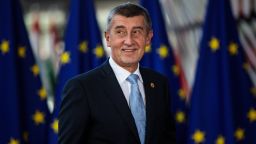Populist Andrej Babis Wins Czech Election, Signals Shift

UPDATE: In a decisive victory, billionaire Andrej Babis has led his ANO party to triumph in the Czech Republic’s parliamentary election held on July 15, 2023. This outcome raises significant implications for Europe’s political landscape, potentially strengthening the populist, anti-immigration movement while diminishing support for Ukraine.
With almost all votes counted, ANO secured 34.7% of the vote, outpacing the second-place Spolu coalition, which garnered 23.2%, according to the Statistical Office. Babis expressed his enthusiasm to supporters, stating, “We want to save Europe … and we are clearly pro-European and pro-NATO.” However, as his party lacks an outright majority, he indicated plans to negotiate with smaller parties, including the far-right SPD, for coalition support.
This election marks a pivotal moment as Babis aims to form a one-party cabinet despite the challenges posed by his party’s minority status. The current Prime Minister, Petr Fiala, has already conceded defeat and congratulated Babis. Analysts project that ANO is expected to secure around 80 seats in the 200-seat lower house of parliament.
Babis’s campaign promised ambitious economic reforms, including faster growth, higher wages, and tax cuts for students and young families. These proposals resonate deeply with Czechs grappling with rising inflation and declining real incomes. However, experts warn that these pledges could cost billions of euros and challenge the nation’s traditionally frugal approach.
Despite his electoral success, Babis faces obstacles ahead. He contends with ongoing fraud allegations related to EU funding and must navigate conflict-of-interest laws due to his ownership of a large chemicals and food empire.
President Petr Pavel is expected to initiate discussions with party leaders on Sunday regarding the appointment of the new prime minister. Babis has also indicated that he would reach out to the Motorists party, which opposes EU Green policies, and the anti-EU, anti-NATO SPD.
The election results show a decline for fringe pro-Russian parties, with SPD only achieving 7.8% of the vote, while the far-left Stacilo! failed to meet the 5% threshold required to enter parliament. Babis, who previously led a center-left cabinet from 2017 to 2021, has shifted his stance over the years, becoming a eurosceptic and aligning himself with populist figures such as former U.S. President Donald Trump.
Babis has rejected calls for a referendum on leaving the EU and NATO, yet he has stated intentions to end the “Czech initiative” that has provided military aid to Ukraine. Under his leadership, ANO aims for NATO and the EU to take charge of Ukraine support, reflecting a significant shift in foreign policy.
As the political landscape in the Czech Republic transforms, all eyes will be on Babis’s next moves and the potential coalition dynamics that could reshape not only the country but also its role within European frameworks. This developing story will continue to unfold, with implications that could reverberate throughout the continent.






